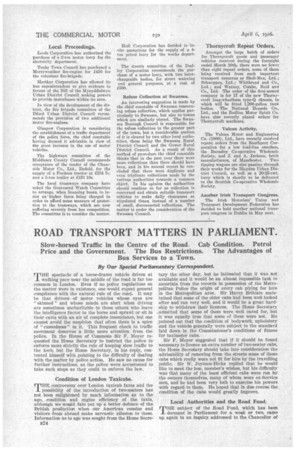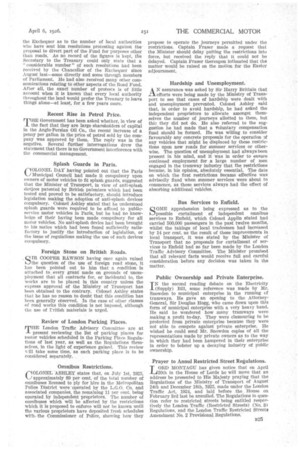ROAD TRANSPORT MATTERS IN PARLIAMENT.
Page 8

Page 9

If you've noticed an error in this article please click here to report it so we can fix it.
Slow-horsed Traffic in the Centre of the Road. Cab Condition. Petrol Price and the Government. The Bus Restrictions. The Advantages of Bus Services to a Town.
By Our Special Parliamentary Correspondent.
THE spectacle of a horse-drawn vehicle driven at walking pace near the middle of the road is far too common in London. Even if no police regulations on the matter were in existence, one would expect general compliance with the natural rule of the road. It may be that drivers of motor vehicles whose eyes are " skinned " and whose minds. are alert when driving are sometimes uncharitable to those others who leave the intelligence factor to the horse and sprawl or sit in their carts with an air of complete insouciance, but one cannot avoid the suspicion that often there is a spice of " cussedness " in it. This frequent check to traffic movement deserves a little more attention from the police. In the House of Commons Sir F. Meyer requested the Home Secretary to instruct the police to
• enforce more strictly the rule of keeping slow traffic to the kerb, but the Home Secretary, in his reply, contented himself with pointing to the difficulty of dealing with the matter by police action. He saw no cause for further instructions, as the police were accustomed to take such steps as they could to enforce the law.
Condition of London Taxicabs.
THE controversy over London taxicab fares and the 1 possibility of the introduction of two-seaters has not been enlightened by much information as to the age, condition and engine efficiency of the taxis, although we would fain put up a better defence of the British production when our American cousins and visitors from abroad make sarcastic allusion to them. Information as to age was sought from the Home Secre B04 tory the other day, but he intimated that it was not available and it would be an almost impossible task to ascertain from the records in possession of the Metropolitan Police the origin of every cab plying for hire in the Metropolitan area. Sir Harry Brittain maintained that some of the older cabs had been well looked after and ran very well, and it would be a great hardship to withdraw their licences. The Home Secretary . admitted that some of them were well cared for, but it was equally true that some of them were not. He pointed out that the condition of bodywOrk, upholstery and the vehicle generally were subject to the standard laid down in the Commissioner's conditions of fitness for taximeter cabs.
Sir F. Meyer suggested that if it should be found necessary to licence an extra number of two-seater cabs, the Home Secretary should take into consideration the advisability of removing from the streets some of those cabs which really were not fit for hire by the travelling public. Sir W. Joynson-Hicks replied that he would like to meet the hon. member's wishes, but his difficulty was that many of the least efficient cabs were run by the owners themselves, many of whom were ex-Service men, and he had been very loth to exercise his powers with regard to them. He hoped that in due course the condition of the cabs would greatly improve.
Local Authorities and the Road Fund.
THE subject of the Road Fund, which has been dormant in Parliament for a week or two, came up again in an inquiry addressed to the Chancellor of
the Exchequer as to the number of local authorities who have sent him resolutions protesting against the proposal to divert part of the Fund for purposes other than road. As no record of the figures is kept, the Secretary to the Treasury could only state that a "considerable number" of such resolutions had been received by the Chancellor of the Exchequer since August last—some directly and some through members of Parliament. He had also received many other communications relating to other aspects of the Road Fund. After all, the exact number of protests is of little account when it is known that every local authority throughout the land would prefer the Treasury to leave things alone—at least, for a few years more.
Recent Rise in Petrol Price.
THE Government has been asked whether, in view of the fact that they are large shareholders of capital in the Anglo-Persian Oil Co., the recent increase of a penny per gallon in the price of petrol sold by the company was approved by them. The reply was in the negative. Several further interrogations drew the statement that there is no Government interference with the commercial management.
Splash Guards in Paris.
COLONEL DAY" having pointed out that the Paris Municipal Council had made it compulsory upon owners of motor vehicles to fit splash guards, suggested that the Minister of Transport, in view of anti-splash devices patented by British patentees which had been tested and proved to be satisfactory, should introduce legislation making the adoption of anti-splash devices compulsory. Colonel Ashley stated that he understood splash guards were required to be affixed to publicservice motor vehicles in Paris, but he had no knowledge of their having been made compulsory for all motor vehicles. No anti-splash device had been brought to his notice which had been found sufficiently satisfactory to justify the introduction of legislation, or the issue of regulations making the use of such devices compulsory.
Foreign Stone on British Roads.
,SIR COOPER RAWSON having once again raised the question of the use of foreign road stone, It has been pointed out to him that a condition is attached to every grant made on grounds of unemployment that all contracts for, or incidental to, the works are to be placed in this country unless the express approval of the Ministry of Transport has been obtained to the contrary. Colonel Ashley states that he has no reason to doubt that this condition has been generally observed. In the case of other classes of road works this condition is not imposed, although the use of I:a-lash materials is urged.
Review of London Parking Places.
MHE London Traffic Advisory Committee are at present reviewing the list of parking places for motor vehicles scheduled in the Parking Pin cc Regulations of last year, as well as the Regulations themselves, in the light of experience gained. This review v.-ill take some time, as each parking place is to be considered separately.
Omnibus Restrictions.
COLONEL ASHLEY states that, on July 1st, 1925, approximately 89 per cent, of the total number of omnibuses licensed to ply for hire in the Metropolitan Police District vvere‘operated by the L.G.O. Co. and associated companies, the remaining 11 per cent, being operated by independent proprietors. The number of omnibuses which will be affected by the restrictions which it is proposed to enforce will not be known until the various proprietors have deposited fresh schedules with the Commissioner of Police, showing how they
propose to operate the journeys permitted under the restrictions. Captain Fraser made a request that the Minister should delay putting the restrictions into force, but received the reply that it could not be delayed. Captain Fraser thereupon intimated that the matter would be raised on the motion for the Easter adjournment.
Hardship and Unemployment.
AN assurance was asked by Sir Harry Brittain that efforts were being made by the Ministry of Transport to see that cases of hardship were dealt with and unemployment prevented. Colonel Ashley said
that, in order to avoid hardship, he had asked the independent proprietors to allocate amongst themselves the number of journeys allotted to them, but this they did not do. He also referred to the suggestion he had made that a toluntary compensation fund should be formed. Be was willing to consider favourably any concrete proposals for the operation of any vehicles that might be displaced by these restrictions upon new roads for summer services or otherwise. The question of unemployment had always been present in his mind, and it was in order to ensure continued employment for a large number of men engaged in the tramway industry that the restrictions became, in his opinion, absolutely essential. The date on which the first restrictions became effective was advisedly, fixed when summer services were about to commence, as these services always had the effect of absorbing additional vehicles.
Bus Services to Enfield.
L./ OME apprehension being expressed as to the possible curtailment of independent omnibus services to Enfield, which Colonel Applin stated had carried 500,000 passengers In the past twelve months, whilst the takings of local tradesmen had increased by 14 per cent. as the result of these improvements in local transport, it was stated by the Minister of Transport that no proposals for curtailment of services to Enfield bad so far been made by the London Traffic Advisory Committee. The Minister promised that all relevant facts would receive full and careful consideration before any decision was taken in the matter.
Public Ownership and Private Enterprise.
TN the second reading debate on the Electricity (Supply) Bill, some reference was made by Mr. Snowden to municipal enterprise in the running of tramways. He gave an opening to the AttorneyGeneral, Sir Douglas Hogg, who came down upon this form of municipal enterprise with a very heavy hand. He said he wondered how many tramways were making a profit to-day. They were clamouring to be protected from private enterprise because they were not able to compete against private enterprise. He wished he could send Mr. Snowden copies of all the representations made by private owners as to the way in which they had been hampered in their enterprise in order to bolster up a decaying industry of public ownership.
Prayer to Annul Restricted Street Regulations.
LORD MONTAGU has given notice that on April 20th in the House of Lords he will move that an address be presented to His Majesty praying that the Regulations of the Ministry of Transport of August 24th and December 18th, 1925, made under the London Traffic Act, 1924, and laid before the House on February 3rd last be annulled. The Regulations in question refer to restricted streets being entitled respectively the London Traffic (Restricted Streets) (No. 3) Regulations, and the London Traffic Restricted Streets Amendment No. 2 Provisional Regulations.
































